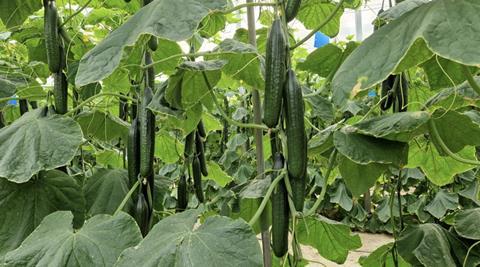Seed company says varieties are specially adapted to the Iberian autumn and winter
Semillas Fitó is seeking to strengthen its position as a supplier of courgette varieties for the Iberian market with two hybrids that have been adapted to autumn and winter conditions.

The company said the virus resistance, agronomic behaviour and excellent fruit quality of Raffaello and Salzillo make them “a key option for farmers seeking profitability, security and sustainability in their crops”.
It described Raffaello as a variety with the ability to adapt to different production areas and types of cultivation – both in the winter and outdoors. “It is a tall, open-architecture plant, which facilitates the formation of well-shaped fruits and simplifies collection,” said Nicolás Sánchez, commercial horticultural technician, adding that its “medium-high vigour, short bones and ease of handling significantly reduce the need for labour”.
According to Fitó, the variety is also tolerant to powdery mildew and viruses transmitted by aphids such as ZYMV and CMV, allowing farmers to reduce phytosanitary applications, improve yield and maintain constant production and quality. “This is a variety designed to provide reliability to the farmer, even in contexts of high viral pressure or climatic changes”, Sánchez said.
The seed company noted that both Raffaello and Salzillo offered uniform dark, shiny, cylindrical fruits with a small pistillate, which guarantees a good aftertaste and an image of freshness that lasts online.
“In the case of Salzillo, its behaviour is specially designed for colder conditions and shorter days, becoming the ideal variety for winter temperatures,” Fitó said. “Its rusticity, together with its excellent fruit quality, allows it to maintain a homogeneous standard throughout the cycle, providing stability and continuity to the value chain.”
Raffaello and Salzillo were developed in collaboration with growers from key production areas such as Almería and Murcia, which allowed Fitó to obtain materials highly adapted to the real conditions of the terrain. This proximity to the farmer has been essential to create varieties that in the soil resist the challenges of autumn and winter, but which also guarantee profitable results.
“Raffaello can be in winter from a limited amount of energy until the end of March, and in free air between March and September, adapting to coastal and inland areas. Salt, on the other hand, is recommended for winter months from October to the end of the season, thus ensuring coverage throughout the cold cycle,” the company said.
Both varieties have a powerful root system, which allows for better absorption of nutrients, greater resistance to soil diseases and greater efficiency in the use of water and inputs.
“These are plants that require less storage, less treatments, and offer more quality production. All of this translates into a real reduction in costs for the farmer and a lower carbon footprint,” Sánchez said.



